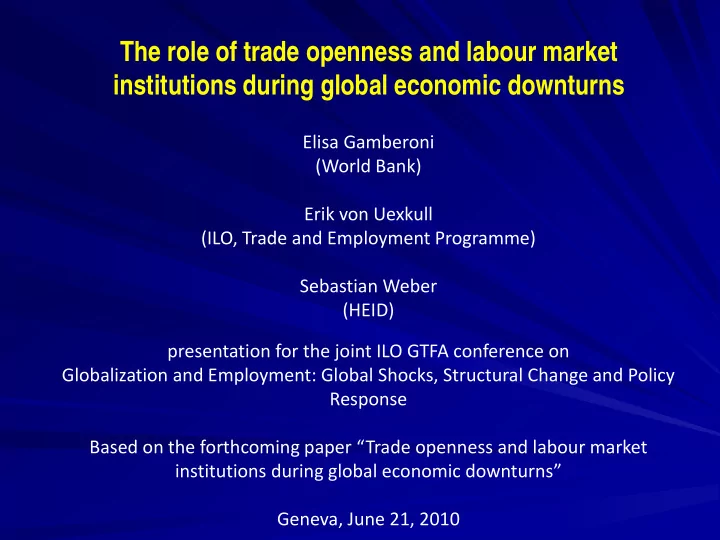

The role of trade openness and labour market institutions during global economic downturns Elisa Gamberoni (World Bank) Erik von Uexkull (ILO, Trade and Employment Programme) Sebastian Weber (HEID) presentation for the joint ILO GTFA conference on Globalization and Employment: Global Shocks, Structural Change and Policy Response Based on the forthcoming paper “Trade openness and labour market institutions during global economic downturns” Geneva, June 21, 2010
The crisis has led to declines in GDP and employment growth around the world: 0.7 0 -0.2 -0.3 -0.6 -0.8 -1.2 -1.9 -2.1 -3.7 -3.9 -4.3 -4.7 -5.1 -5.7 -6.1 -6.2 -6.2 -8.2 Change in Real GDP growth (2009 - 2007) -14.1 Change in Employment growth (2009 - 2007)
This raises some obvious questions... • How long will it take for employment growth to recover? • Will there be “catch-up” growth in employment, or will employment remain below its pre-crisis trend? • What role can policy play to mitigate the employment effect and promote recovery?
Past global downturns 5 World GDP growth 4 3 2 Asian crisis Employment .com bubble 1 growth and 9/11 1991 crisis 0 1985 1986 1987 1988 1989 1990 1991 1992 1993 1994 1995 1996 1997 1998 1999 2000 2001 2002 2003 2004 2005 2006 2007 2008 2009 -1 -2
The impact of crises on employment • Alternatively: Laeven and Valencia (2008) dataset on domestic debt and banking crisis (country specific) • Employment growth from 1985 to 2008 from ILO Laborsta and KILM (excluding TREND estimations) • Sample of 42 countries with at least 10 years of data: 20 industrialized and 22 developing countries • Data on severance pay in monthly salaries after 9 months, 4 years, 20 years of employment from IMF / Fondazione Debenedetti • Data on share of previous wage replaced by unemployment benefits 1 year after job loss from IMF / Fondazione Debenedetti • Trade openness from WDI
Some Stylized Facts 1. No recovery before 2 years 2. Little evidence of catch up 3. Stronger decline under domestic crisis (~ -2%) than imported crises (~ -1%)
The Model and the limitations • Model captures the impact of crisis and policy variables in the first 3 years after the crisis start Not an analysis on the LR employment growth but a short run view • It is an asymmetric analysis: we only look at a negative shock • It does not say how long it would take for recovery to happen (either it takes place in the first 3 years or we can see it) • We cannot investigate all dimensions of the employment legislation protection nor the impact on wages and working hours • Why? DATA restriction
....And very generous unemployment benefits are associated with stronger reductions in employment growth...
Conclusions 1. Domestic crises cost more in employment growth terms than imported crisis 2. Higher firing costs dampened the effects of the crises on employment growth. Countries with extremely generous unemployment benefits experienced a deeper negative impact on employment growth 3. Deeper integration in the economy lead to a deeper and faster slowdown of employment growth, particularly during domestic crises, but also to a faster and sharper recovery 4. Data limitation prevent more accurate analysis: lwhat was the effect of other labor market policies? What happened to informal employment? How did wages react?
The role of trade openness and labour market institutions during global economic downturns Elisa Gamberoni (World Bank) Erik von Uexkull (ILO, Trade and Employment Programme) Sebastian Weber (HEID) presentation for the joint ILO GTFA conference on Globalization and Employment: Global Shocks, Structural Change and Policy Response Based on the forthcoming paper “Trade openness and labour market institutions during global economic downturns” Geneva, June 21, 2010
Recommend
More recommend